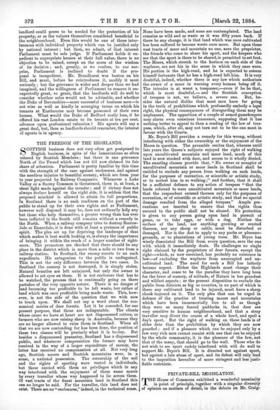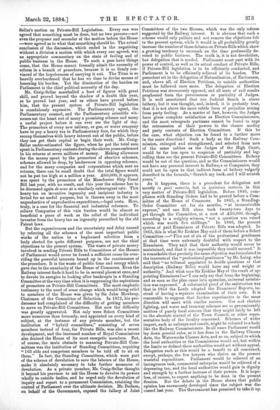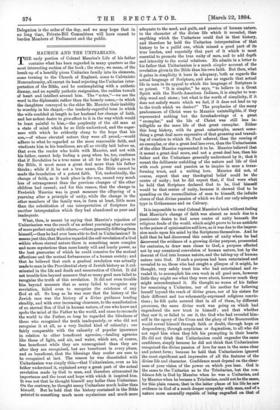PRIVATE-BILL DEGISLATION.
THE House of Commons exhibited a wonderful unanimity in point of principle, together with a singular diversity of opinion on matters of detail, in the debate on Mr. Craig-
Sellar's motion on Private-Bill Legislation. Every one was agreed that something must be done, but no two persons—not even the proposer and seconder of the motion before the House —were agreed as to what that something should be. The actual conclusion of the discussion, which ended in the negativing without a division a motion with which every one agreed, was an appropriate commentary on the state of feeling and of public business in the House. To such a pass have things come, that the House cannot formally admit the necessity of reform in a branch of procedure, because it is so firmly con- vinced of the hopelessness of carrying it out. The Titan is so heavily overburdened that he has no time to devise means of lessening his burden. Yet the diminution of the burden on Parliament is the chief political necessity of the day. Mr. Craig-Sellar marshalled a host of figures with great skill, and proved beyond the shadow of a doubt this year, as he proved last year, and as others have proved before him, that the present system of Private-Bill legislation is scandalously expensive. The Parliamentary agent, the Parliamentary counsel, and the Parliamentary scientific wit- nesses eat the heart out of many a promising scheme and many a useful project before it can ever see the light of day. The promoters of every new railway, or gas, or water company have to pay a heavy tax in Parliamentary fees, for which they recoup themselves with heavy interest out of the public, before they can get their capital or begin their work. Mr. Craig- Sellar under-estimated the figure, when he put the total sum spent in Parliamentary contests during the eleven years embraced in his returns at seven millions of money. Making allowance for the money spent by the promoters of abortive schemes, schemes allowed to drop, by landowners in opposing schemes, and for the many companies and corporations which sent no returns, there can be small doubt that the total figure would not be put too high at a million a year. £60,000, it appears, was spent by the promoters of the Manchester Ship Canal Bill last year, with no result, and this year the scheme has to be discussed again de novo at a similarly extravagant rate. This heavy tax on inventive ingenuity and incipient industry is levied for no useful purpose, but is thrown away in the most unproductive of unproductive expenditure,—legal costs. Here, truly, is a case for the financial, and industrial reformer. To relieve Companies of this vain burden would be almost as beneficial a piece of work as the relief of the individual inventor from the heavy tax on ingenuity prescribed by the old Patent laws.
But the expensiveness and the uncertainty and delay caused by referring all the schemes of the most important public works of the nation to a haphazard selection from a body elected for quite different purposes, are not the chief objections to the present system. The waste of private money involved in sending Private Bills to Committees of the Houses of Parliament would never be found a sufficient cause for over- riding the powerful interests bound up in the continuance of the procedure. It is the waste of public time and energy which gave rise to the unanimity of the House of Commons. Even the Railway interest finds it hard to be in several places at once, and to devote its energies to looking after bankrupts in a Standing Committee at the very time when it is suppressing the aspirations of promoters on Private-Bill Committees. The most emphatic testimony to the need of some change which would bring relief to members of the House was given by Sir John Mowbray, Chairman of the Committee of Selection. In 1872, his pre- decessor had complained of the difficulty of getting members to serve on Private-Bill Committees. But now the difficulty was greatly aggravated. Not only were Select Committees more numerous than formerly, and appointed on every kind of subject, at the instance of any private member, but the institution of "hybrid committees," consisting of seven members instead of four, for Private Bills, was also a recent development, and the increased number of Royal Commissions also drained the House of its most energetic members. But, of course, the main obstacle to manning Private-Bill Com- mittees was the institution of Standing Committees, requiring "163 able and competent members to be told off to sit on them." In fact, the Standing Committees, which were part of the scheme of devolution to save the labours of the House, make it absolutely necessary to take further measures of devolution. As a private member, Mr. Craig-Sellar thought it beyond his province to askthe House to devolve its powers wholly to outside bodies, and he urged only the devolution of inquiry and report to a permanent Commission, retaining the control of Parliament over the ultimate decision. Mr. Dodson, on behalf of the Government, exposed the fallacy of Joint
Committees of the two Houses, which was the only reform suggested by the Railway interest. It is obvious that such a scheme would only palliate and not remove the objections felt to the present system, while it would in all probability greatly increase the number of those debates on Private Bills which show a growing tendency to encroach on the time professedly de- voted to public business. The truth is, it is not devolution, but delegation that is needed. Parliament must part with its power of control, as well as its actual conduct of Private Bills, if Private-Bill legislation is to be efficiently conducted, and Parliament is to be efficiently relieved of its burden. The precedent set in the delegation of Naturalisation, of Enclosures, and, above all, of Election Petitions, to outside authorities must be followed once more. The delegation of Election Petitions was strenuously opposed, and all sorts of evil results prophesied from the perverseness or partiality of Judges. It is well ascertained that our Judicial Bench is above bribery, but it was thought, and, indeed, it is probably true, that it is not above the more subtle form of prejudice arising from party feeling. As a matter of fact, however, the Judges have given complete satisfaction as Election Commissioners, and the most retrograde partisans cannot be found to urge the retrocession of their powers to the chance medley and party contests of Election Committees. If this be the case, what objection can be found to a further move in the same direction Such a body as the Railway Com- mission, enlarged and strengthened, and selected from men of the same calibre as the Judges of the High Court, would be far less open to suspicion of partiality and log- rolling than are the present Private-Bill Committees. Bribery would be out of the question, and as the Commissioners would not have any personal interest in Railways or Companies, they could not be open to that indirect form of bribery vulgarly described in the formula," Scratch my back, and I will scratch yours."
As it happens, there is a precedent for delegation not merely in pan i materia, but in ipsissima materia, in this very matter of Private-Bill legislation. Before 1846, com- pliance with Standing Orders had to be proved before a Com- mittee of the House of Commons. In 1845, a Standing- Order Committee sat for six months, "at inconceivable expense," and one Bill alone took twenty-two days to get through the Committee, at a cost of .210,000, though, according to a weighty witness, "not a question was raised which was worth five shillings." In 1846, the present system of paid Examiners of Private Bills was adopted. In 1863, this is what Sir Erskine May said of them before a Select Committee :—" Five out of six of the professional gentlemen at that time were extremely doubtful with respect to the Examiners. They said that their authority would never be maintained, and that it was impossible they could succeed." It is remarkable that precisely the same objection was formulated in the interests of the "professional gentlemen" by Mr. Laing, who said that "no tribunal appointed to decide questions of that description (Railway Bills) would have any real weight or authority." And what says Sir Erskine May of the result of ap- pointing Examiners?—" I can only say that from the beginning, and as soon as the plan came into operation, universal satisfac- tion was expressed." A substantial proof of the satisfaction wae that in 1854 the Lords adopted the Examiners' Reports, in7 stead of having a separate examination of their own. It is reasonable to suppose that further experiments in the same direction will meet with similar success. Gas and electric lighting, and water and tramway schemes are so preeminently matters of purely local concern that they might fairly be left to the absolute control of the Town Council, or other repre- sentative body of the locality concerned. Schemes of wider import, such as railways and canals, might be referred to a body like the Railway Commissioners. In all cases Parliament would lay down general rules, as it has done in the Railway Clauses Acts, the Waterworks Clauses Acts, and so on, subject to which the local authorities or the Commissions would act, but within the limits so defined these authorities would act without appeal. Delegation such as this would be a benefit to all concerned, except, perhaps, the few lawyers who thrive on the present wasteful expenditure. Parliament would be relieved of an incongruous task, commercial enterprise would be relieved of a depressing tax, and the local authorities would gain in dignity and strength by a further increase of their powers. It is hope- less, of course, to expect anything to be done in the present Session. But the debate in the House shows that public opinion has enormously developed since the subject was dis- cussed last year. The Government has promised to take it up.
Delegation is the order of the day, and we may hope that in no long time, Private-Bill Committees will have ceased to burden Members of Parliament and the public.




































 Previous page
Previous page